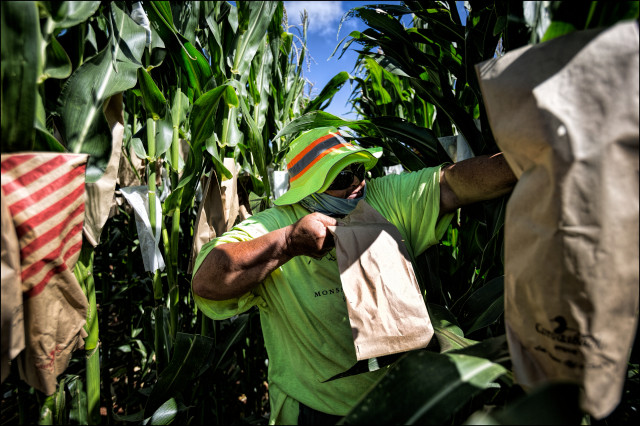The EPA is also looking into alleged pesticide violations at Wonder Farm in Waianae. Meanwhile, a probe of Syngenta continues.
The U.S. Environmental Protection Agency is investigating Monsanto, Terminix and Wonder Farm for allegedly violating pesticide laws in Hawaii.
The ongoing investigations are three of five pesticide-related cases in Hawaii that the federal agency has worked on this year.
The most high-profile ongoing investigation involves Syngenta, a seed company that operates on Kauai and Oahu. Ten Syngenta workers on Kauai went to the hospital in January after walking onto a field where chlorpyrifos had been applied 20 hours earlier.
EPA spokesman Dean Higuchi confirmed four investigations are ongoing, but declined to share any additional details or provide copies of the complaints because the cases are still being investigated.

A Terminix Kauai employee said the company wasn’t following proper procedures, prompting an EPA investigation.
Higuchi said a fifth case against Honolulu Wood Treating wrapped up in April. The EPA fined the company $33,750 for “producing and selling a mislabeled pesticide on five occasions in 2013 and 2014,” according to a press release.
Scott Enright, director of the state Department of Agriculture, said the agency refers cases to the EPA when they involve federal jurisdiction, repeat violations or serious allegations.
The state agency’s pesticide branch has historically struggled with limited resources and delayed investigations, prompting an EPA-requested action plan to reduce its backlog of cases.
Terminix Employee Complaint
Terminix, a Tennessee-based pest control company, allegedly violated pesticide regulations throughout its Kauai operations, according to a quarterly report sent from the state Department of Agriculture to the EPA earlier this year.
An April 2016 complaint from a Kauai Terminix employee said workers lacked proper equipment for fumigations and that their self-contained breathing apparatus were not filled with air.
Terminix Kauai employees also allegedly did not use scales, which weigh fumigants, or clearing devices that determine whether buildings are safe to enter, according to the complaint.
Workers were allegedly told to “remove placards and secondary locks without using a clearing device before structures were reoccupied,” the report said. “This is an ongoing investigation and Terminix has retained lawyers and all requests for information has to go through their legal counsel.”

Scott Enright
Office of the Governor
A spokesman for Terminix said the company is aware of the investigation and has been working with the Department of Agriculture, but declined to comment further.
Enright said he referred the case to EPA because the complaint included multiple allegations.
“We thought there was a seriousness to it that we wanted them to look at,” Enright said.
Terminix was fined $10 million in March for using methyl bromide, a banned pesticide, in the Virgin Islands. The toxic pesticide poisoned a Delaware family vacationing in St. John, including two teenagers who sustained permanent brain damage.
The company was also sued last year after a 10-year-old boy in Florida “sustained a catastrophic brain injury” after Terminix fumigated his home for termites. His sister and grandmother also got sick, but he lost the ability to walk, USA Today reported.
Agricultural Pesticide Problems
Unlike the Terminix complaint, no information about the Monsanto and Wonder Farm cases was included in quarterly reports that the state Department of Agriculture submitted to EPA over the past two years.
Neither Higuchi nor Enright would share details about the cases, citing policies against commenting on ongoing investigations.
Enright said only that the department referred the Monsanto case to the EPA in May because it fell under federal jurisdiction, and referred the Wonder Farm case to the EPA in January 2015 because of repeated violations at the Waianae farm.
“If we have someone who we believe is intentionally not working with the department in using pesticides correctly, we hand them off to the big guy,” Enright said of the Wonder Farm case.

A Monsanto field worker pollinates corn on Molokai.
PF Bentley/Civil Beat
A Monsanto spokeswoman said she did not have enough information about the investigation to comment. Wonder Farms did not respond to a request for comment.
The use of agricultural pesticides, particularly by large seed companies, has been a frequent subject of political debate in Hawaii.
Both Monsanto and Syngenta grow genetically modified corn on thousands of acres in the islands and have lobbied aggressively against bills that would require companies to share publicly when and where they apply pesticides and in what amounts.
The EPA fined Monsanto $600,000 last year for failing to report the release of hundreds of toxic chemicals in Idaho, NBC news reported.
Last month, the EPA settled a case with Syngenta for $1.2 million after the company mislabeled pesticides in multiple states, among other violations.
